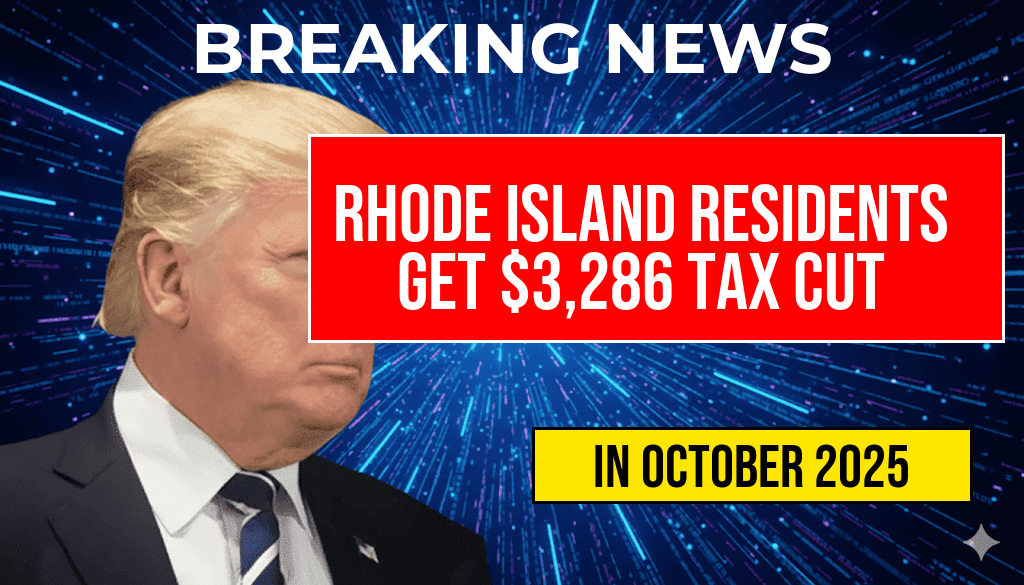Rhode Island Residents to Receive Estimated $3,286 Tax Cut in Upcoming Fiscal Relief
Residents across Rhode Island are set to benefit from an anticipated average tax reduction of approximately $3,286 as part of a recent state budget adjustment aimed at providing fiscal relief amidst ongoing economic recovery efforts. The adjustment, approved by state lawmakers earlier this month, is projected to impact thousands of taxpayers by lowering income tax rates and increasing deductions. Officials emphasize that this initiative reflects Rhode Island’s commitment to supporting working families and stimulating local economic growth. The tax cut is expected to take effect starting with the 2024 tax season, offering immediate financial relief and potentially boosting consumer spending within the state.
Details of the Tax Relief Package
Scope and Impact
The approved legislation allocates roughly $150 million toward targeted tax reductions over the next fiscal year. According to estimates from the Rhode Island Department of Revenue, the average individual taxpayer will see a reduction of about $3,286 in their annual tax liability. This figure is based on current income distribution patterns, with higher-income residents benefiting proportionally more due to progressive tax structures.
Key Components
- Lower Income Tax Rates: The legislation reduces the top marginal income tax rate from 5.99% to 5.75%, affecting filers earning over $100,000 annually.
- Increased Standard Deduction: The standard deduction for single filers increases by $500, and for joint filers, by $1,000, effectively lowering taxable income.
- Expanded Tax Credits: Child and earned income tax credits are expanded to benefit more low- and middle-income families.
- Phase-Out Adjustments: The income thresholds for phase-out of certain credits are raised, allowing more residents to qualify for benefits.
Economic Context and Rationale
State Budget Considerations
Rhode Island’s fiscal outlook has improved following consecutive years of economic growth, aided by federal pandemic relief funds and increased revenue collections. According to the state’s Department of Revenue, state revenues for fiscal year 2023 surpassed projections by 8%, largely driven by higher-than-expected income and sales taxes. This surplus has enabled policymakers to allocate funds toward tax relief without compromising essential services.
Policy Goals
State officials aim to bolster household disposable income, reduce tax burdens that disproportionately affect middle-class families, and enhance overall economic stability. Governor Dan McKee highlighted that “this tax relief package is a step toward creating a more equitable and resilient Rhode Island economy by putting more money directly into the pockets of residents.”
Public and Political Reactions
Support from Lawmakers
Legislators across party lines have generally supported the measure, citing its potential to stimulate economic activity and improve quality of life. Senate Finance Chair Sylvia R. Tanzi stated, “This tax cut is a direct investment in our residents and small businesses, helping to create a more competitive environment.”
Concerns and Criticisms
Some critics argue that the tax reduction may lead to budget shortfalls in future years, potentially impacting funding for education, infrastructure, and healthcare programs. Fiscal watchdog groups warn that while the relief is timely, it must be carefully managed to sustain long-term fiscal health.
Projected Outcomes and Future Steps
Economic Benefits
Economists suggest that the increased disposable income could lead to heightened consumer spending, supporting local businesses and job creation. The Rhode Island Economic Development Corporation (RIEDC) anticipates a modest uptick in retail activity and service-sector employment as a result of the tax cuts.
Monitoring and Adjustments
The state plans to review the fiscal impact of the relief package annually, with adjustments in subsequent years based on revenue performance and economic conditions. Officials are also considering additional measures, such as targeted property tax relief and workforce development initiatives, to complement the current efforts.
Additional Resources and Context
| Income Range | Tax Rate |
|---|---|
| $0 – $41,500 | 3.75% |
| $41,501 – $100,000 | 4.75% |
| Over $100,000 | 5.99% (reduced to 5.75% in 2024) |
For further insights into Rhode Island’s fiscal policies and economic outlook, visit the Rhode Island Economy – Wikipedia and the Forbes article on state tax strategies.
Frequently Asked Questions
What is the estimated tax cut for Rhode Island residents?
Rhode Island residents are expected to receive an estimated $3,286 tax cut, providing significant savings on their state taxes.
When will Rhode Island residents see the tax cut benefits?
The tax cuts are projected to be reflected in residents’ tax refunds or reduced tax bills starting in the upcoming tax season.
What are the main reasons for this tax cut in Rhode Island?
The tax cut is primarily due to recent state budget adjustments and economic growth, which have increased revenue and allowed for tax relief.
How might this tax cut impact Rhode Island’s economy?
The tax cut is expected to boost consumer spending and support local businesses, potentially stimulating economic growth across the state.
Are there any changes to Rhode Island’s tax laws related to this cut?
Yes, the tax cut involves adjustments to tax rates and brackets, making it easier for residents to benefit from lower taxes this year.






